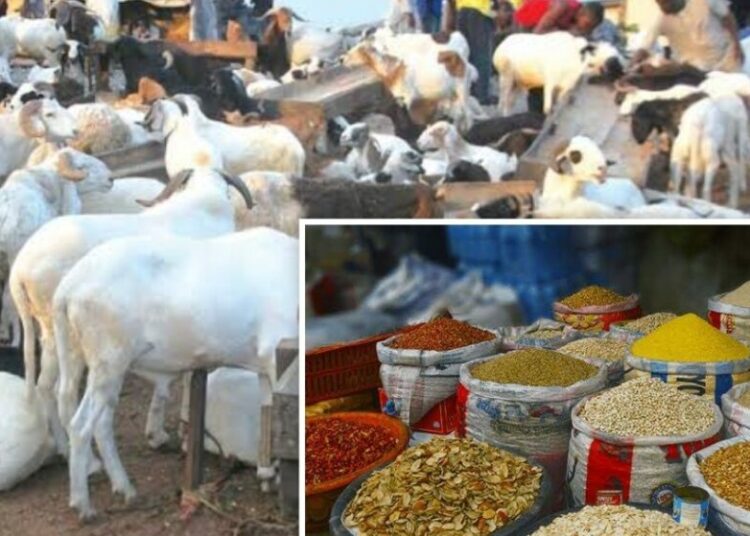Although, Eid-el-Fitr and Easter supposed to be celebrations that comes with wearing the best of clothes, eats the best of meals, merry with families, friends and relatives, however, the harsh economic realities has ensured that Nigerians had to cut down expenses, seek alternatives in the midst of low disposable income, LEADERSHIP Sunday can now reveal.
Therefore, as Nigerians celebrate Eid-el-Fitr with Easter celebration expected in the next three weeks, the Muslim and Christian communities face the dual challenge of observing these sacred festivals while navigating the country’s harsh economic crisis.
With inflation soaring above 30 per cent and unstable food prices reported to be on a recent decline, traditional means are being adapted to reflect both religious devotion and economic realities.
The federal government had earlier declared tomorrow, Monday, March 31, and Tuesday, April 1, 2025, as public holidays to mark the Eid-el-Fitr celebration.
In the spirit of the celebration, Nigerians and Muslims alike have expressed that the economic downturn has significantly affected festivities and traditional Eid celebrations.
Although Eid-el-Fitr is not known for killing rams, there are some Muslims who always slaughter either cows, rams or goats in the spirit of the celebration. However, the price of these proteins is fast becoming prohibitive due to high cost with an average ram now costing between N150,000 to N250,000 while the big ones cost as high as N500,000 and above. The goats, on the other hand, now sell between N90,000 and N350,000 depending on the size and location in the South-West part of Nigeria. For cows, it is being sold between N500,000 and N1million, hence, some had to go for lesser protein or go for chicken and turkey because they could not afford their choiced animal.
Many families who previously slaughtered animals annually are now pooling resources, with some sharing a cow among three or more people.
In a chat with a Muslim faithful, Abubakar Alimi cited that basic food items have become the priority over festive luxuries, with some Muslims opting out of animal sacrifice.
“On my part, despite financial constraints, Nigerian Muslims are finding creative ways to preserve the essence of Eid through modified feasting. As a family, we are scaling down on elaborate meals as this is not advisable at this present time. We will be observing our Zakat as this is an obligatory charity that we do, though the donations would consist of more basic staples like rice or flour rather than expensive items,” he said.
He added that, “the essence of Eid lies in gratitude, worship, and community and not material display, so I will advise that shared celebrations and modified traditions are fully acceptable in times of hardship.
“Hence, greater emphasis be placed on the spiritual aspects: prayers, forgiveness, and family bonding with community sharing inculcated to mitigate the economic shock as this will see neighbours combining resources for collective celebration.”
While looking forward with hope, as expressed by 69-year-old Musiliu Lawal, “I have slaughtered a ram every year be it for Eid El Fitri Or Eild Mubarak starting from 1989 but the economy is hitting hard, and I can’t, I just can’t keep up.” Yet, his continued participation in prayers and community events demonstrates how Nigerian Muslims are maintaining the core values of Eid despite economic challenges.
Meanwhile, prices of clothes materials vary, with brocade ranging from N1,500 to N2,500 per yard and lace going for between N2,500 to N5,000 for one yard. Despite the high prices, many Nigerians are willing to spend money on new clothes for the celebrations.
A fabric seller in Lagos, Victoria Eze,said, ‘We have seen a huge demand for clothes materials in the past few weeks. People are buying all kinds of materials, and we’re struggling to keep up with the demand.’
A tailor in Lagos, Temitope John,stated that, ‘it is a special occasion, and people want to look their best. We are working around the clock to meet the demand for custom-made outfits.’
Owner of Adetomiwa Fashion House, Sanni Balikis, shared her experiences and insights on the high demand for custom-made outfits ahead of the Sallah celebration, revealing that, plain materials are the most in-demand during the Sallah season, followed by abayas with stoning designs or flower patterns.
When asked about how she sources her fabrics, Balikis said, it depends on the quality of the material. She also shared that, “she uses the internet and YouTube to stay up-to-date with the latest fashion trends. On average, it takes Balikis two days to complete a custom-made outfit, but she does not offer rush-order services due to the high demand and time constraints.”
There are no signs of festivities coming up, according to Halimat Adeyemi, founder of House of Lima, a clothing business.
“As a person selling clothes, everything we are experiencing does not look normal. When you ask people who sell clothes, especially those native wear them, we usually encounter a boom in sales because people will buy clothes they will wear to the Mosque. Before now, I did not have the luxury of time going out because of patronage as I am fully engaged in sales at the market. But we have not seen people coming because most people are having low purchasing power,” Adeyemi noted.
She alluded that the low patronage can be traced to the harsh economic climate Nigerians are faced with, saying, “there is no big difference in the price of the clothes sold last year and now. The difference is not more than N500. For example, one of the stones we sell to decorate clothes—the price increased last December ahead of this year’s fasting because they were anticipating high demand for it. But the same stone, the price has come down now, and we have not witnessed people coming to buy.”
An Artisan at Oke-Ira, Ogba, Lookman Kelani said, to start with, coping with fasting has been challenging due to the high cost of foodstuffs, not to mention celebrating the festival. “The fasting has become almost unbearable, forcing us to manage with minimal resources. Sometimes, we skip meals or consume insufficient portions to continue fasting, as we have no choice but to fast despite the circumstances because foodstuff prices remain high.
“Clothing is not within our budget at the moment, as acquiring clothes now requires at least N40,000 to N50,000 for purchase and tailoring for myself and my family. Let us forget about buying clothes for now. Even foodstuff for the Salah, I am uncertain about how I will manage. We are praying that the cost of items reduces before the Salah period,” Kelani pointed out.
A recent decline in the cost of food price was attributed to low demand and fuel price splash, even though the prices of essential commodities have remained high and might skyrocket a bit.
Mrs Mercy, a raw food trader said, “I was expecting prices to drop ahead of Sallah, and Easter but unfortunately, it seems they will remain the same. Though small grains are now about N67,000 previously sold between N80,000 to N90,000, the long grain rice is between N90,000 and N100,000.”
Similarly, Ngozi Uzor, a civil servant expressed her frustration about the cost of items at the market.
She said: “The price of clothing has also skyrocketed. I wanted to buy new clothes for my children for Easter, but the prices are too high and not pocket-friendly as a pair of shoes that used to cost N5,000 now sells for N10,000.”
Despite the relative cost of goods and commodities, some people are determined to experience the Sallah and forthcoming Easter festivities.
“I have already bought new clothes for my family, and we will celebrate Sallah with our friends and relatives,” said Alhaji Bello, a businessman.
On his part, Mr. John Nandi, a Christian remarked that Easter is a time for renewal and celebration, noting that, ‘we will attend church services on Easter Sunday and hold a family gathering afterwards.’
As the festive season approaches, many are calling on the government to intervene through fiscal and monetary policies that will lead to a slash in the prices of essential commodities.
‘The government should do something to reduce the prices of foodstuffs, clothes, and other things. It’s not fair that people should suffer during the festive season,’ said Mohammed.
Earlier, many Nigerians who had spoken to LEADERSHIP, claim that the cost of living is very high, with food prices continuing to burden already struggling households.
A Lagos resident, Moses Mabum expressed skepticism over the reported price reductions, noting that, ‘Food is still expensive. Nothing has reduced. The price of garri, rice, and beans are still high for us. Nothing has reduced.’
A foodstuff wholesaler, Chibest, noted that, while the price of some food items had decreased, the reductions were insufficient. “Rice was N80,000 per bag, but now, it has reduced to N70,000, Beans was N2,000 per ‘derica’ cup earlier, but now, it’s being sold at N1,000 although, it’s still not enough,” she said.
Chibest also noted that, ‘there is joblessness, unemployment is also one of the causes of hunger as people without a good paying job can’t afford a decent meal.’
Another wholesaler, Mummy Bee shared her experience with the fluctuating prices of oil. “I bought 25 liters of red oil for N60,000 in January and February, but now, it’s N47,000. However, this reduction is not enough to alleviate the hunger and hardship faced by many Nigerians,” she said.
Mummy Bee emphasised that, despite the slight reduction in oil prices, hunger remains a significant issue. “There is hunger, very big hunger. People can’t afford three square meals. It’s hard, very hard. It’s just by God’s grace that some people are managing,” she said.
Mary Adebayo, a mother of four, lamented over the costs of food which have remained imbalanced, saying, “Currently, Rice is N1,200 per ‘derica’ measurement. Oil and pepper are very expensive. Everything costs too much. We’re suffering. Expenses wan kill us for Nigeria, we are working, we don’t even see what we are using the money to do.”
Hence, Nigerians who spoke to LEADERSHIP urged the government to take concrete steps to address the issue, with many calling for increased support for farmers, improved food distribution systems, and targeted subsidies to alleviate the burden on low-income households.











